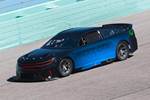NASCAR unveils BEV prototype featuring natural fiber bodywork
Implementation of Bcomp technical flax fibers in a U.S. motorsport first represents NASCAR’s step toward more sustainable competition vehicles.
NASCAR prototype bodywork feature Bcomp flax fiber.
NASCAR (Dayton Beach, Calif., U.S.) has debuted the first version of its new battery electric vehicle (BEV) prototype, featuring bodywork made from flax fibers developed and supplied by Bcomp (Fribourg, Switzerland).
NASCAR’s BEV prototype is claimed to be the first major U.S. motorsports project to incorporate flax-based composites. The high-performance bodywork uses Bcomp’s ampliTex technical fabrics in conjunction with powerRibs, which were first inspired by the vein structure of leaves, to harness the natural advantages of sustainable flax fiber.
Accordingly, this is a step toward implementing more sustainable measures into NASCAR competition vehicles. Under the NASCAR IMPACT umbrella, in April 2023 NASCAR committed to achieving net-zero operating emissions by 2035 and set a series of 5-year sustainability targets, including sourcing 100% renewable electricity at all owned tracks and offices and expanding EV charging infrastructure across the company’s facilities.
Bcomp’s composites offer a sustainable alternative to traditional carbon fiber, reducing CO2 emissions by up to 85% at similar stiffness, and improving safety in motorsports thanks to a breaking behavior that eliminates sharp shattering, a safety aspect that is especially relevant in bumper-to-bumper racing.
NASCAR BEV prototype.
“Integrating sustainable innovations into the design process helps set the standard for sustainability across our industry and supports progress toward the company’s sustainability goals and targets,” emphasizes NASCAR vice president of vehicle design, Brandon Thomas.
“We are thrilled to be entering this important phase with NASCAR with whom we have a strong shared vision for sustainability,” adds Johann Wacht, key account manager, automotive and motorsports, at Bcomp. “This collaboration is Bcomp’s first major U.S. motorsport project, and we are excited to demonstrate together with the NASCAR IMPACT team how racing can pave the way for sustainable innovations, enabling benefits for wider society further down the road.”
Related Content
-
TPI manufactures all-composite Kenworth SuperTruck 2 cab
Class 8 diesel truck, now with a 20% lighter cab, achieves 136% freight efficiency improvement.
-
Al Seer Marine, Abu Dhabi Maritime unveil world’s largest 3D-printed boat
Holding the new Guinness World Record at 11.98 meters, the 3D-printed composite water taxi used a CEAD Flexbot to print two hulls in less than 12 days.
-
Partners recycle A350 composite production waste into adjustable-length rods for MFFD
Herone, Spiral RTC, Teijin Carbon Europe and Collins Aerospace Almere recycle A350 thermoplastic composite clips/cleats waste into rods for the all-thermoplastic composite Multifunctional Fuselage Demonstrator’s crown.






